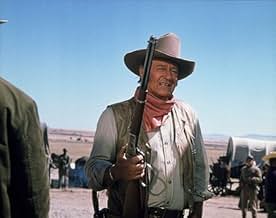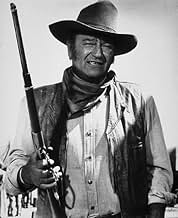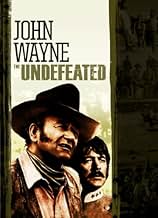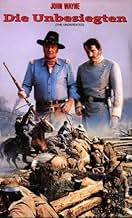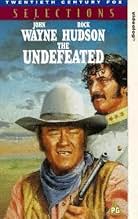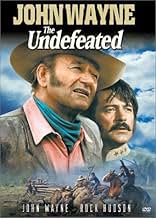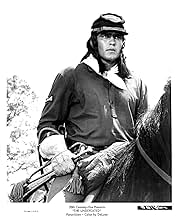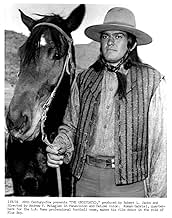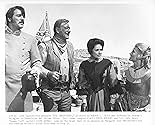PUNTUACIÓN EN IMDb
6,6/10
8 mil
TU PUNTUACIÓN
Tras la Guerra de Secesión, exsoldados confederados que se dirigen a México se encuentran con exsoldados de caballería de la Unión, pero deben unir sus fuerzas para luchar contra los bandido... Leer todoTras la Guerra de Secesión, exsoldados confederados que se dirigen a México se encuentran con exsoldados de caballería de la Unión, pero deben unir sus fuerzas para luchar contra los bandidos y revolucionarios mexicanos.Tras la Guerra de Secesión, exsoldados confederados que se dirigen a México se encuentran con exsoldados de caballería de la Unión, pero deben unir sus fuerzas para luchar contra los bandidos y revolucionarios mexicanos.
- Dirección
- Guión
- Reparto principal
Antonio Aguilar
- Gen. Rojas
- (as Tony Aguilar)
Jan-Michael Vincent
- Bubba Wilkes
- (as Michael Vincent)
Reseñas destacadas
The Undefeated is directed by Andrew V. McLaglen and adapted for the screen by James Lee Barrett from a story by Stanley L. Hough. It stars John Wayne & Rock Hudson, features a musical score by Hugo Montenegro and William H. Clothier provides the South Western cinematography.
Much yee-hawing and lots of patriotic fervour, The Undefeated is a fun and undemanding way for the Western fan to spend a couple of hours. Plot basically revolves around some post Civil War rivalries between Union and Confederate leaders played by Wayne and Hudson respectively. Both men and the groups they have under their control, get mixed up in the Maximillian/Juarez revolution in Mexico. Cue moral quandaries, big decisions and life affirming human interests; as McLaglen (aided by Wayne apparently) directs unfussy without pushing the envelope of Western directing. True enough at times the tone is uneven, it's hard to tell if it's meant to be light hearted or serious during some passages (kind of why John Ford was a genre master since he could achieve it comfortably), and some casting decisions are rather baffling (hello Roman Gabriel); but it's all very spirited, especially Hudson, to round it out as a solid genre offering from the late 1960s. 6.5/10
Much yee-hawing and lots of patriotic fervour, The Undefeated is a fun and undemanding way for the Western fan to spend a couple of hours. Plot basically revolves around some post Civil War rivalries between Union and Confederate leaders played by Wayne and Hudson respectively. Both men and the groups they have under their control, get mixed up in the Maximillian/Juarez revolution in Mexico. Cue moral quandaries, big decisions and life affirming human interests; as McLaglen (aided by Wayne apparently) directs unfussy without pushing the envelope of Western directing. True enough at times the tone is uneven, it's hard to tell if it's meant to be light hearted or serious during some passages (kind of why John Ford was a genre master since he could achieve it comfortably), and some casting decisions are rather baffling (hello Roman Gabriel); but it's all very spirited, especially Hudson, to round it out as a solid genre offering from the late 1960s. 6.5/10
Set in the period just after the Civil War, "The Undefeated" pits ex-Union officer John Wayne against ex-Confederate officer Rock Hudson in an amiable, if uneven, big-budget western. Hudson, as Colonel James Langdon, leaves his ancestral home after the defeat of the Confederacy and leads his family and friends southwards on a trek to find a new home in Emperor Maximilian's Mexico. Meanwhile, Colonel John Henry Thomas, played by Wayne, gathers his ex-army buddies and endeavors to round up and sell horses to the U.S. Army. The two men and their followers meet up in Northern Mexico and find themselves embroiled in the struggle between French-backed supporters of Maximilian and Mexican nationalists who back Benito Juarez. The resulting film, directed by Andrew V. McLaglen, is a predictable western with enough action and friendly verbal sparring between the former battlefield enemies to entertain for the two-hour running time.
Besides Wayne and Hudson, the cast benefits from such veteran western stalwarts as Bruce Cabot, Ben Johnson, Paul Fix, Harry Carey Jr., John Agar, and Dub Taylor. However, the film's most outstanding assets are a fine musical score by Hugo Montenegro and exceptional cinematography by William H. Clothier; Clothier captures sweeping vistas of northern Mexico, a herd of galloping horses, mounted cavalry advancing across battlefields, and horse-drawn wagons fording a river that enhance the visual spectacle of "The Undefeated."
Unfortunately, the film falters during a silly mass fist fight between the Northerners and Southerners, and the anachronistic romance between a Native American scout and Langdon's daughter creates a time warp; the pairing of a Southern white woman with a Native American in the days after the fall of the Confederacy is pure fantasy. Well coiffed and made-up ladies in formal French gowns dining on make-shift tables outside their covered wagons is also a stretch of credibility; no dust or grime intrudes on their frontier life. The friendly bonding between the former adversaries Langdon and Thomas and their followers is equally unlikely, and, although Wayne and Hudson make strange bedfellows, they work well together. While not among the landmark westerns of Wayne's career, "The Undefeated," elevated by Clothier's outstanding cinematography, Montenegro's score, and a supporting cast of familiar western faces, is solid entertainment and well worth discovering or re-discovering.
Besides Wayne and Hudson, the cast benefits from such veteran western stalwarts as Bruce Cabot, Ben Johnson, Paul Fix, Harry Carey Jr., John Agar, and Dub Taylor. However, the film's most outstanding assets are a fine musical score by Hugo Montenegro and exceptional cinematography by William H. Clothier; Clothier captures sweeping vistas of northern Mexico, a herd of galloping horses, mounted cavalry advancing across battlefields, and horse-drawn wagons fording a river that enhance the visual spectacle of "The Undefeated."
Unfortunately, the film falters during a silly mass fist fight between the Northerners and Southerners, and the anachronistic romance between a Native American scout and Langdon's daughter creates a time warp; the pairing of a Southern white woman with a Native American in the days after the fall of the Confederacy is pure fantasy. Well coiffed and made-up ladies in formal French gowns dining on make-shift tables outside their covered wagons is also a stretch of credibility; no dust or grime intrudes on their frontier life. The friendly bonding between the former adversaries Langdon and Thomas and their followers is equally unlikely, and, although Wayne and Hudson make strange bedfellows, they work well together. While not among the landmark westerns of Wayne's career, "The Undefeated," elevated by Clothier's outstanding cinematography, Montenegro's score, and a supporting cast of familiar western faces, is solid entertainment and well worth discovering or re-discovering.
"The Undefeated" (1969) teams up John Wayne and Rock Hudson as ex-Union and Confederate officers after the Civil War in Mexico. Langdon (Hudson) wants to relocate his family & friends whereas Thomas (Wayne) wants to make money selling horses to Emperor Maximilian. The problem is that Benito Juarez and his followers are at war with Maximilian and this causes unforeseen problems for the Americans, who have no choice but to team-up.
The set-up of story is great and loosely based on Joseph Orville "Jo" Shelby and his Missouri raiders and their families who really did seek to relocate to Maximilian's Mexico, but had to return after the victory of Juarez' forces. The movie starts with a Civil War battle and the announcement that Lee has surrendered and the war is over, which segues into Langdon and Thomas and their people going to Mexico for completely different reasons; and then they meet. This is great, but the filmmakers add some goofiness, like an over-the-top, fun-spirited brawl between the Confederates and Federals at a 4th of July party in the wilderness. These types of scenes were fairly common in Wayne Westerns at the time and I always thought they detracted from these movies. There's a way to mix realistic comedy into a movie and a way not to and this isn't the way. Besides, how can a serious brouhaha be fun? When you punch people in the face in real life they get bloody noses and missing teeth; here they just laugh it off.
Another problem is NFL quarterback Roman Gabriel as a full-blooded Native American and adopted son of Thomas. No matter how you slice it, he looks like a white dude with a mop of black hair. To add insult to injury, Langdon's cute daughter (Melissa Newman) falls head-over-heals in love with him and the way it happens simply isn't realistic. Would a genuine Southern belle really swoon over a full-blooded Indian who visits their encampment? Would no one notice that the two have wandered off to make-out, in plain view of the others? Would Col. Langdon really not mind that his daughter is sucking face with a full-blooded Native? In our day and age it's no big deal and most people could care less, but it's still an issue in some circles; how much more so back then, particularly with a proud Southern Colonel and his people?
If you can overlook these flaws, however, this is a very worthwhile Western with quality drama, action, characters and locations (shot in Baton Rouge, Louisiana, and Durango, Mexico). The cast is also notable. Besides the two stars, you also get Lee Meriwether, Marian McCargo, Jan-Michael Vincent (in a too-small role), Merlin Olsen, Ben Johnson and various Wayne Western staples.
This is a likable Western because the people are so likable. For instance, the way one group is unselfishly willing to let go of something of great worth on behalf of another group blows the mind, but it reveals their nobility and the fact that they value human beings more than they do monetary gain, but only because they've found them worthy. It also reveals respect and the willingness to forgive & heal after the nation's most bloody war.
The film runs 119 minutes.
GRADE: B-
The set-up of story is great and loosely based on Joseph Orville "Jo" Shelby and his Missouri raiders and their families who really did seek to relocate to Maximilian's Mexico, but had to return after the victory of Juarez' forces. The movie starts with a Civil War battle and the announcement that Lee has surrendered and the war is over, which segues into Langdon and Thomas and their people going to Mexico for completely different reasons; and then they meet. This is great, but the filmmakers add some goofiness, like an over-the-top, fun-spirited brawl between the Confederates and Federals at a 4th of July party in the wilderness. These types of scenes were fairly common in Wayne Westerns at the time and I always thought they detracted from these movies. There's a way to mix realistic comedy into a movie and a way not to and this isn't the way. Besides, how can a serious brouhaha be fun? When you punch people in the face in real life they get bloody noses and missing teeth; here they just laugh it off.
Another problem is NFL quarterback Roman Gabriel as a full-blooded Native American and adopted son of Thomas. No matter how you slice it, he looks like a white dude with a mop of black hair. To add insult to injury, Langdon's cute daughter (Melissa Newman) falls head-over-heals in love with him and the way it happens simply isn't realistic. Would a genuine Southern belle really swoon over a full-blooded Indian who visits their encampment? Would no one notice that the two have wandered off to make-out, in plain view of the others? Would Col. Langdon really not mind that his daughter is sucking face with a full-blooded Native? In our day and age it's no big deal and most people could care less, but it's still an issue in some circles; how much more so back then, particularly with a proud Southern Colonel and his people?
If you can overlook these flaws, however, this is a very worthwhile Western with quality drama, action, characters and locations (shot in Baton Rouge, Louisiana, and Durango, Mexico). The cast is also notable. Besides the two stars, you also get Lee Meriwether, Marian McCargo, Jan-Michael Vincent (in a too-small role), Merlin Olsen, Ben Johnson and various Wayne Western staples.
This is a likable Western because the people are so likable. For instance, the way one group is unselfishly willing to let go of something of great worth on behalf of another group blows the mind, but it reveals their nobility and the fact that they value human beings more than they do monetary gain, but only because they've found them worthy. It also reveals respect and the willingness to forgive & heal after the nation's most bloody war.
The film runs 119 minutes.
GRADE: B-
Saw this film around 30 years ago. At that time I thought it just a fairly formulaic star vehicle, bringing together the grizzled, typical Wayne cowboy character with someone who was a newer and - at the time -a really big name in Rock Hudson. Seeing it anew in 2007, I realise my earlier estimate was too dismissive by far. It has a good plot with many original aspects, well described already on the web-site by earlier reviewers, especially the linkage of US civil war with events happening at the same time in Mexico. Not being a huge fan, ordinarily, of either of the main stars, it has to be said they both turn in good performances and are fully believable as leaders whom other men would naturally follow, and who inspire fierce loyalties. The dialogue has a few unexpectedly good lines and is generally above average standard. The stars play it light-heartedly, and this gives the film warmth, colour and humour. Some aspects of the film, admittedly, conform to the hackneyed Wayne cowboy film recipe, such as the free-for-all fist fight, but in general the film stands up well nearly 40 years after it was made, and it has held on to a much more modern feel than other Wayne westerns. The musical score just about carries enough grandeur to match the action and the occasionally majestic cinematography, especially the scenes involving the drive across country of a few thousand horses. Any film-lover who enjoys the more upmarket western should give this film a try. The nearly two hours pass quickly, and it's a film to make you think (about the nature of war against your fellow countrymen, about loyalty, friendship and heroism) and escapist enough to make you smile.
This moving western has Yankee colonel Henry Thomas (John Wayne) joining forces with Confederate official named Langdon (Rock Hudson), during the post-Civil War and in Mexican territory . Wayne tries to sell wild horses to the French military in Mexico and Hudson leading a wagon train to Durango . Both colonels battling it out toe to toe and side by side across 2000 miles of thundering adventure . They feared no one , Juarista rebels , cut-throat bandits, the armies of Maximilian, as they challenged an angry land and each other . The two big men with reckless courage clash and nothing can match them ,the big men ride and nothing can stop them . Through a thousand dangers and a thousand thrills they fight their glorious way to destiny , conquering desert , risks , savage outlaws , and enemy soldiers.
This agreeable Western packs adventures , silly romance , action , shootouts and historical events about American Civil War and Mexican war between Emperor Maxilimilian and Juaristas . Casting is frankly good, the legendary John Wayne , Rock Hudson . Before filming began, John Wayne had to lose most of the weight he had put on in order to play Rooster Cogburn in True grit (1969). According to director Andrew V. McLaglen, his first choice for the role of Colonel James Langdon was James Arness, who was willing to do it but backed out just before shooting began ; Rock Hudson was brought in as his replacement . John Wayne became good friends during the shoot with Rock Hudson and even joked that he'd rather have been born with Hudson's movie star face than his own. Magnificent plethora of secondaries , as usual John Ford's actors , Ben Johnson, Bruce Cabot, John Agar, Harry Carey Jr , among others . Furthermore , ordinary cameraman William H Clothier (Cheyemne Autumm , Man who shot Liberty Valance , Horse soldiers) who creates a luminous and colorful cinematography . Lively and evocative musical score by Hugo Montenegro . The motion picture was well directed by Andrew V. McLagen , a known Ford's disciple . He's a Western expert (McLintock, Shenandoah, Bandolero, Chisum , Cahill , Way west) and warlike genre craftsman (Return to Kai, Wild Geese , Sea Wolves). Rating : acceptable and passable. The movie will appeal to Wayne and Hudson die-hard fans.
This agreeable Western packs adventures , silly romance , action , shootouts and historical events about American Civil War and Mexican war between Emperor Maxilimilian and Juaristas . Casting is frankly good, the legendary John Wayne , Rock Hudson . Before filming began, John Wayne had to lose most of the weight he had put on in order to play Rooster Cogburn in True grit (1969). According to director Andrew V. McLaglen, his first choice for the role of Colonel James Langdon was James Arness, who was willing to do it but backed out just before shooting began ; Rock Hudson was brought in as his replacement . John Wayne became good friends during the shoot with Rock Hudson and even joked that he'd rather have been born with Hudson's movie star face than his own. Magnificent plethora of secondaries , as usual John Ford's actors , Ben Johnson, Bruce Cabot, John Agar, Harry Carey Jr , among others . Furthermore , ordinary cameraman William H Clothier (Cheyemne Autumm , Man who shot Liberty Valance , Horse soldiers) who creates a luminous and colorful cinematography . Lively and evocative musical score by Hugo Montenegro . The motion picture was well directed by Andrew V. McLagen , a known Ford's disciple . He's a Western expert (McLintock, Shenandoah, Bandolero, Chisum , Cahill , Way west) and warlike genre craftsman (Return to Kai, Wild Geese , Sea Wolves). Rating : acceptable and passable. The movie will appeal to Wayne and Hudson die-hard fans.
¿Sabías que...?
- CuriosidadesBefore filming began, John Wayne had to lose most of the weight he had put on in order to play Rooster Cogburn in Valor de ley (1969).
- PifiasA number of times in the early part of the movie, reference is made to the surrender of Robert E. Lee to Ulysses S. Grant as the end of the war. Although the surrender of Lee is now seen as the effective end of the war, at the time it was not and would not have been considered such by most people (the Confederate major in the opening battle being an example). Organized military operations continued for more than a month after Lee's surrender.
- Citas
Col. James Langdon: If I can find the time, I'm going to sit down and write the social history of bourbon.
- ConexionesFeatured in Rock Hudson's Home Movies (1992)
Selecciones populares
Inicia sesión para calificar y añadir a tu lista para recibir recomendaciones personalizadas
- How long is The Undefeated?Con tecnología de Alexa
Detalles
- Fecha de lanzamiento
- País de origen
- Idiomas
- Títulos en diferentes países
- Los invencibles
- Localizaciones del rodaje
- Empresa productora
- Ver más compañías en los créditos en IMDbPro
Taquilla
- Presupuesto
- 7.115.000 US$ (estimación)
- Duración
- 1h 59min(119 min)
- Relación de aspecto
- 2.35 : 1
Contribuir a esta página
Sugerir un cambio o añadir el contenido que falta


